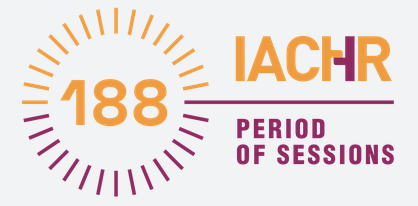Twenty-three human rights organizations condemn police abuse with less-lethal weapons before the IACHR-CIDH
The hearing at the Inter-American Commission on Human Rights aims to express concern over the use of weapons such as kinetic impact projectiles and tear gas cartridges.
Press Release
23 HUMAN RIGHTS ORGANIZATIONS CONDEMN POLICE ABUSE WITH LESS LETHAL WEAPONS IN PROTESTS BEFORE THE INTER-AMERICAN COMMISSION ON HUMAN RIGHTS (IACHR)
[November 9, 2023] Twenty-three (23) international organizations have come together to condemn state violence amid the increasing use of less lethal weapons in public demonstrations and the violation of human rights by security forces. This comes in the context of a regional hearing on the use of force in social protests, held today at 2:00 PM at the headquarters of the Inter-American Commission on Human Rights in Washington DC, United States. The hearing will be live-streamed on the IACHR’s website.
The hearing aims to express concern over the use of weapons such as kinetic impact projectiles and tear gas cartridges. Some of these weapons discharge multiple projectiles simultaneously, making them inherently indiscriminate. Others have metallic components that can cause irreparable damage. In both cases, they are inappropriate for use in crowd control. All this weaponry can be misused, leading to serious injuries, permanent disabilities, and in some cases, death. As part of the delegation, Alicia Ruth Tapuy Santi participates in the hearing. She is the widow of Byron Guatatuca, a leader of the Kichwa community in the Puyo area of Ecuador who died after being hit by a tear gas cartridge in the head.
The consequences of the irregular use of less lethal weapons by police forces can be observed in various countries:
-In Bolivia, after social mobilization processes in 2019, less lethal weapons were used, resulting in the death of 27 people.
-In Peru, until February 2023, 60 people died in protest, and 1,300 more were injured, due to arbitrary use of force, arrests, and sexual violence. In Peru, in 2016, a young person suffered a permanent eye injury from a rubber bullet during a student protest. At least two deaths have been recorded from impacts of tear gas cartridges, and multiple deaths from the use of pellets.
-In Colombia, between 2019 and 2021, approximately 2,820 cases of torture were reported, including deaths from arbitrary and excessive use of force, eye injuries, and gender-based violence. Until 2023, at least 169 cases of eye trauma were recorded, 17 of them with rubber bullets fired at the face. At least 11 deaths occurred with the use of less lethal weapons.
-In Chile, during protests in 2019, at least 460 people suffered eye injuries from rubber pellet impacts or tear gas canisters.
-In the United States, in May 2020, a protester suffered facial fractures from a rubber bullet shot, while in another case, someone lost vision from the impact of a tear gas cartridge to the face. From the protests following the murder of George Floyd, over 950 incidents of police violence were recorded.
-In Argentina, during protests in 2023, a young man lost his eye from a rubber bullet shot. At least two other people suffered eye injuries.
-In Brazil, during a protest in 2020, a 13-year-old boy was hit by a rubber bullet and lost his eye. In 2021, during a protest against former President Jair Bolsonaro in the city of Recife, Pernambuco, two men who were not even participating in the protest lost their eye after being hit by rubber bullets.
-In Puerto Rico, since 2019, more than 146 police interventions against individuals in protests have been documented. At least 56 of these, or 39%, resulted in injuries. Most of these injuries were caused by the use of less lethal weapons such as tear gas, including the launching of canisters, rubber-coated metal bullets, and pepper spray.
-In Ecuador, during a protest in 2022, a man died from a head impact with a tear gas cartridge. In another protest in the same year, another man died after receiving impacts from metallic pellets in the chest and abdomen.
-In Venezuela, during a protest in 2017, a man died after being hit by a tear gas cartridge in the chest.
The IACHR is the principal and autonomous organ of the Organization of American States (OAS) responsible for the promotion and protection of human rights in the Americas.
The organizations participating in this effort are:
- Centro de Estudios Legales y Sociales (CELS), Argentina
- Justiça Global, Brasil
- Terra de Direitos, Brasil
- Colectivo de Abogados y Abogadas José Alvear Restrepo (CAJAR), Colombia
- Centro de Estudios de Derecho, Justicia y Sociedad – Dejusticia, Colombia
- ILEX Acción Jurídica, Colombia
- Temblores Ong, Colombia
- Campaña Defender la Libertad: Asunto de todas, Colombia
- Fundación Comité de Solidaridad con los Presos Políticos, Colombia
- Observatorio Ciudadano, Chile
- Centro de Estudios y Promoción de los Derechos Humanos de la Universidad de la Frontera, Chile
- Núcleo Interdisciplinario de Derechos Humanos, Chile
- Fundación Regional de Asesoría en Derechos Humanos – INREDH, Ecuador
- American Civil Liberties Union (ACLU), Estados Unidos
- Comité de Familiares de Detenidos Desaparecidos en Honduras (COFADEH), Honduras
- Comisión Mexicana de Defensa y Promoción de los Derechos Humanos (CMDPDH), México
- Asociación Pro Derechos Humanos (APRODEH), Perú
- Kilómetro 0, Puerto Rico
- Programa Venezolano de Educación-Acción en Derechos Humanos (PROVEA), Venezuela
- Omega Research Foundation
- Amnistía Internacional (AI)
- Organización Mundial contra la Tortura (OMCT)
- Centro por la Justicia y el Derecho Internacional (CEJIL)
- International Network of Civil Liberties Organizations (INCLO)
